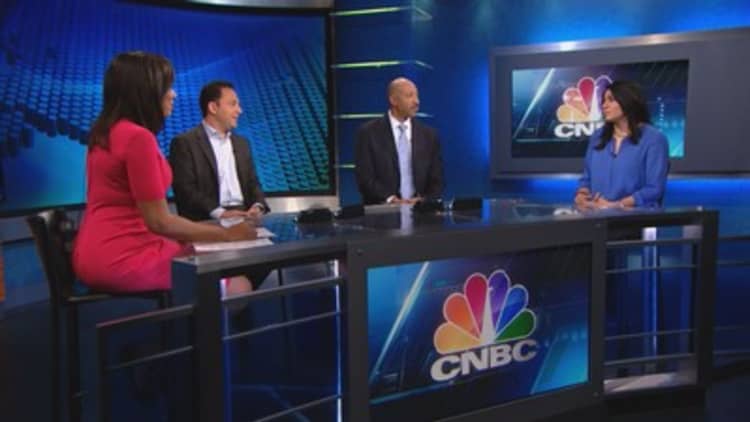
If you're newly retired or nearing retirement, chances are you've looked at your current living situation and wondered if the grass is greener somewhere else, whether down the street or across the country.
During the last recession, many older Americans felt stuck in place, having seen the value of their investment portfolios and homes plummet. As the economy bounced back, so too has what one demographer calls the senior migration rate, the percentage of Americans ages 55 and older who make local and long-distance moves domestically.
Last year, the senior migration rate reached 5 percent, marking a return to pre-recession levels, according to an analysis of Census Bureau data by William Frey, a demographer at the Brookings Institution.
Steven Giacona, a certified public accountant in the New York metro area, has noticed a slight uptick in older clients moving to be near family members or relocating to states where the cost of living and taxes are lower. Some of his newly retired clients, he said, are more open to the idea of moving than they were during the recession or right after it.
"There is still a lot of volatility in the market, which makes people nervous, but the recession and its immediate aftermath caused a lot of anxiety for a lot of people," said Giacona, managing partner at Round Table Wealth Management. "That anxiety led many people to feel paralyzed. We are seeing more fluidness now in the movement of some clients," he added.
While many people ponder a late-life move, the majority of American retirees actually age in place, and those who do move generally don't go far, according to Rodney Harrell, director of AARP's Livable Communities program.
No place like home
On the whole, retirees prefer to remain where they have family and friends and connections to churches, synagogues and other local institutions, said Harrell. According to the Brookings Institution, less than 1 percent of Americans made an interstate move last year.
"One thing we consistently find in surveys [of older adults] is that most people want to stay in their homes and communities," said Harrell, who pointed out it's regardless of whether those homes and communities are well suited for older adults.
When retirees do pick up and move, many are following well-worn paths, leaving colder or high-cost states such as New York, New Jersey and California for traditional retirement destinations with warm weather, a relatively low cost of living and other perks for seniors.
Between 2010 and 2013, the five most attractive states for seniors, as measured by average annual net migration for the 55-plus set, were Florida, Arizona, South Carolina, Texas and North Carolina, respectively, according to Brookings. Florida was the biggest draw by far, netting more than 61,000 seniors per year between 2010 and 2013.
"Florida has not given up the mantle of being a retirement mecca for seniors," said Frey of Brookings.
As retirement moves have made a comeback, another interesting pattern has emerged: Many smaller cities that have attracted large numbers of millennials have also become magnets for older adults. The metro areas of Austin; Denver; Portland, Oregon; and Raleigh, North Carolina, for example, were big draws for seniors between 2010 and 2013, according to Brookings.
The softer issues are generally the more important ones when it comes to relocating. Money is only part of the equation.Evan Beachcertified financial planner with Campbell Wealth Management
"There is a great deal of overlap in the types of things that older adults and millennials want," such as walkable neighborhoods with amenities and good access — by car or public transportation — to jobs, health care and attractions in surrounding areas, said Harrell of AARP.
Earlier this year, AARP launched a free online tool called the Livability Index, which allows consumers to see how specific neighborhoods rank in terms of their suitability for aging in place. The rankings are based on multiple categories, including housing (including affordability), neighborhood qualities, transportation, environment, health, engagement and opportunity.
If you are mulling a late-life move, advisors say one of the first things to consider is how it might impact your cost of living, which not only includes housing prices but also associated expenses, such as homeowners' association fees. Many retirees who are moving to be closer to their adult children are settling in hip, fast-growing markets, where housing prices are soaring, said Rebecca Kennedy, a certified financial planner at Kennedy Financial Planning, who has seen this trend play out in Denver, where she practices.
"Retirees are moving to Denver to be closer to family and are having to take on new mortgages or come out of pocket [beyond what they earned on the sale of a previous home] when purchasing a home here because the housing market is so hot now," Kennedy said.
Taxes, crime rates, access to quality health care and the cost of traveling to visit relatives are also big considerations for anyone mulling a retirement move, particularly a long-distance move.
When it comes to taxes, seven states — Washington, Nevada, Wyoming, South Dakota, Texas, Florida and Tennessee — have no income tax or tax on Social Security benefits, according to an AARP analysis of taxes by state. But states with no income tax may have relatively high property and/or sales taxes.
Ultimately, the biggest challenge some retirees face is reestablishing a community of friends when they move, which is why many are drawn to places with large numbers of seniors. Those who relocate to be near grown children also run the risk that their kids will pick up and move someday, possibly for a job in a distant place. For a host of reasons, it makes sense to rent initially or maybe split time between two places when transitioning to a new city during retirement, advisors say.
"The softer issues are generally the more important ones when it comes to relocating," said Evan Beach, a certified financial planner with Campbell Wealth Management. "Money is only part of the equation."
— By Anna Robaton, special to CNBC.com







